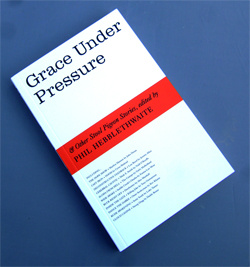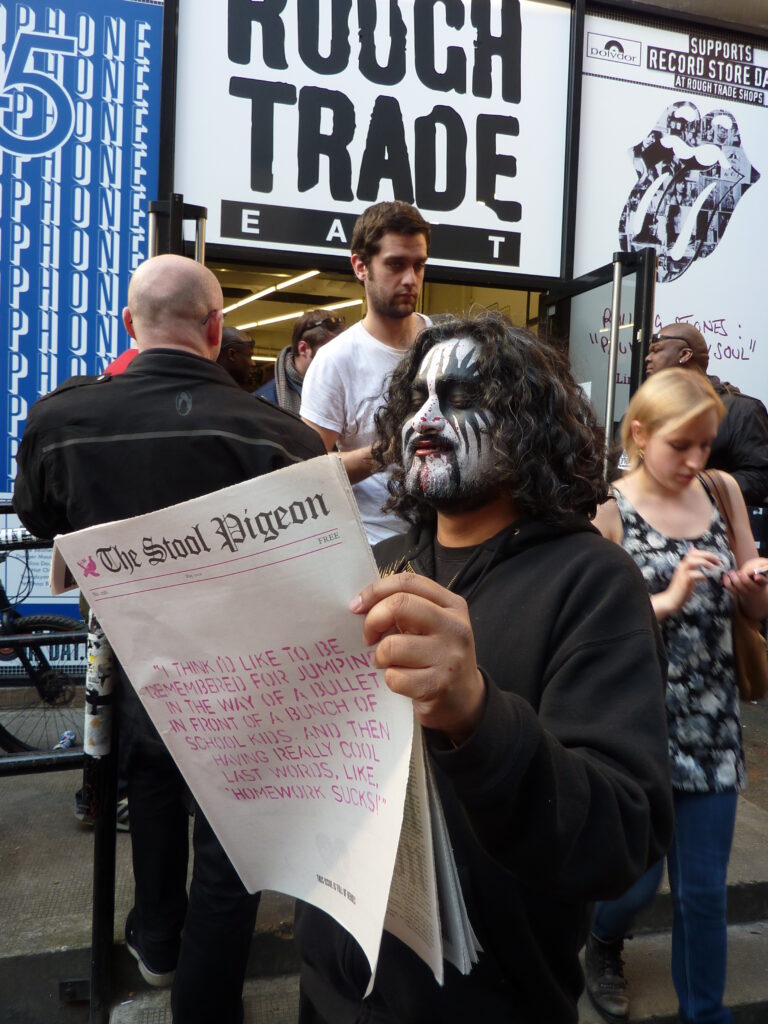Mickey Gibbons and I launched The Stool Pigeon on January 2, 2005. We printed 10,000 copies of issue one, which we drove as far as Nottingham (from London) before running out. We held back 25 bundles for the Slint ATP in February and a lot of people there thought the whole paper was made up.
Mickey (art director) and myself (editor) had worked together for three years beforehand and knew something about how to put the editorial side of a publication together. The rest was a baptism of fire and still is. We’ve learned a whole tonne of stuff since we started the paper and also had things we already believed in reinforced a billion times over.
Editorial by committee is bad
Everyone keeps talking about the death of the printed music magazine/newspaper and I’ll suggest it has a lot to do with the way many titles are run in 2010 — by a committee of editors/designers/publishers/ad departments/marketing monkeys/cleaning ladies/etc. I think there should be war at the heart of a good magazine — between the editor and his creative director; the editorial staff and their publisher/money people; and also between the title and its readers. You know when a magazine is about go tits up. It’s the issue after they do a readers’ survey.
The Stool Pigeon is a team of three people doing everything, so some of these conflicts go on inside my own head. What to do if a writer emails in a scathing review of a record from a label I’ve just sold an ad to? Easy: run the review unedited and enjoy an excellent night’s sleep. That advertiser will come back eventually, once they’ve realised that we hold no grudges against people who pull their ads in fury.
For now, no one has a clue how to make money in publishing
The print vs web debate has been raging for years and it’s becoming more and more fascinating. Of course, ink freaks like Mickey and myself are convinced there will always be space for printed media, even though it’s painfully hard to make a newspaper like ours work financially. With exceptions, websites are struggling too, leading to a massive dilemma: how to make journalism sustainable? Murdoch deciding to charge for content on some his newspaper sites is a bold statement. The man’s a cunt, but no fool. The internet evangelists think he’s lost it, but their solutions are just as questionable. Depressing times for publishing? Not at all. Exciting. We love a good punch up here at The Stool Pigeon.
Music writing is not a lifestyle
People who want to become music hacks because they envisage a life of doing coke backstage with some indie band or, worse, the band’s PR people, are deluded. You can’t report on anything if you become part of it and I’ve made mistakes over last five years; of becoming friends with a few of the many good people who work in the music biz, then later really upsetting them by dumping all over their artists/labels in the paper, which I’ll never hold back from doing. It’s not personal, but I’ve learned that you can’t expect people to realise that.
Music writing today is as good as it’s ever been, and probably better
I’m proud of the writing we’ve run in The Stool Pigeon and I think the two books we’ve just published are really good. So it narks me when old timers say that music journalism is a thing of the past.
When we launched, these old timers said The Stool Pigeon reminded them of how NME used to be, which surprised me — I’ve never been an NME reader. Intrigued, I started buying old issues off eBay, but they haven’t been a revelation. Take this copy, from 1968. The My Lai massacre and Martin Luther King’s assassination have just taken place, and Paris is burning. NME open their issue with this: “Engelbert Humperdinck may be a relatively new star on the pop scene, but his professionalism and quiet manner have become an established hit with his co-stars in the London Palladium panto Robinson Crusoe.” Whoops.
Doing things DIY-style is a boring necessity
Up until the last issue, we’d drive 2,500 miles in two vans each time we printed, hand-delivering our entire run to all of our stockists across the UK. We did so because it was the only cost-effective way and we needed to build up a list of suitable stockists capable of dealing with the large numbers of papers we always wanted to print. It took us five years, but it was a success. You can get The Stool Pigeon in 82 towns/cities across Britain these days, but being stuck in the centre of Middlesbrough when you have York, Leeds, Barnsley and Sheffield to cover in the same day, or screw up your whole delivery plan, was deeply frustrating and supremely dull. We have now outsourced all of our non-London distribution and it feels… beautiful. Strangely enough, all of our stockists in Middlesbrough have gone bust in the last year or so, rendering all 25 trips I made to that city completely redundant. Oh well.
There’s no north/south divide in world of The Stool Pigeon
I assumed that a couple of southern boys trying to break their paper in northern England and Scotland would be almost impossible. Not so. The north have embraced us in a way that I never imagined, and cities like Glasgow, Liverpool, Manchester and Leeds have become crucial Pigeon strongholds. It’s been really satisfying getting to know those places intimately by visiting them so often. Liverpool is the New Orleans of England. I didn’t realise that five years ago.
There’s an art to being tight.
In 2002, I wrote an article for Men’s Health and they still send me their horrible magazine every month. Such extravagance would never happen at The Stool Pigeon. I believe it’s fundamental that massive numbers of specific people receive copies of the paper each issue (subscribers, contributors and advertisers, obviously, but also those who might be able to help you in the future, even though they don’t know it yet), so we hand-deliver 80 per cent of our gigantic mailing list while we’re out distributing papers. We only send copies if essential and, when possible, we do so with unstamped stamps steamed off from jiffy bags sent into the paper.
My hero in the art of being tight (and many other things) is Bill Gaines, the now-deceased publisher of EC Comics and Mad magazine. He would sometimes hold an emergency meeting to find out who had made an international call. I appreciate that. However, Bill would also take his entire staff on epic, all-expenses-paid trips to exotic destinations each year. That doesn’t happen at The Stool Pigeon.
Never miss a deadline
Really, if you can’t get your shit together to print on the day you said you would, give up. Deadlines at The Stool Pigeon always involve 35-hour or longer sessions with no sleep and, personally speaking, insane pressure makes me lose my appetite, so I struggle to eat. I am not an adrenaline junky. I once puked with dread in the days running up to deadline, and when our printer finally presses the big red button (a second after we’ve uploaded our final page), I never feel elated — I feel bruised, blackened, paranoid, and riddled with self-hatred and fear. I know I am doing myself appalling mental and physical damage, but I also know that no one stands a chance in life if they can’t even stick to something as rudimentary as a deadline.
Locality in music is dead
The internet seems to have destroyed this idea of a city rising in music, like Seattle did with grunge, or whatever. I’d like to be wrong, because I think locality is important, but I don’t think music writers should be waiting for a new Madchester to cover. All pop music is a fusion of sorts in 2010, but that needn’t necessarily mean it’s diluted. In The Stool Pigeon, Garry Mulholland has been saying that this year will be the best for music since 1981 — another year of great experimentation and blending of forms/ideas. I thought he was mad when I first read that, but I’m beginning to agree.
I’m a musical conservative
If you’re more into music than your friends when you’re a teenager, they might lead you to believe that you have extreme taste. You might well do, but the older I get the more I realise that I’m a musical conservative. I despise anything indirect, beard-strokey or avant-garde in music and I feel a distinct loosening of the bowels when I read phrases like ‘found sounds’ in information about a record (unless the artist does something rhythmic and/or melodic with his findings, as Pantha du Prince did with his superb recent album). Actually, are the Velvet Underground and Sunn O))) avant-garde? I love them. Quietus John, help me out. “The avant-garde is only good if you can drink beer to it.” Thank you, John.
Gangstas don’t dance, they boogie
Think about that. It’s important. So is staying away from the rookies.

The Stool Pigeon have just published two books: Grace Under Pressure, a collection of the best stories from the last five years of the magazine, and We Need You Lazzaro, You Lazy, Greasy Bastard, the collected writings of long-serving columnist Son of Dave. Click here for more information


